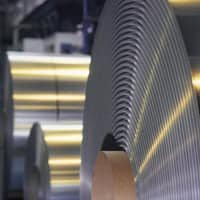
Steel is 100% recyclable and can be used time and time again with no loss of quality.
Corus is the UK’s biggest steel manufacturer and employs nearly 50,000 people in 40 countries. It is the eighth largest steel maker in the world with an annual turnover of nearly £10 billion. Corus has major steelworks in the UK at various locations including Port Talbot, Scunthorpe, Teesside and Rotherham.
Steel making is a very competitive business. In 2004, Corus launched a programme called ‘Restoring Success’, which aims to give the company a lead over rivals in efficient production. This programme focuses on eliminating wasteful activities and ensuring efficient production. A key part of this is an emphasis on recycling steel. Through its strong recycling credentials, Corus stands out from its rivals as a responsible business that is committed to sustainable development.

The world economy is growing at a staggering rate. New economies in India and China, each with more than a billion people, have joined the global trading system. This means that the demand for resources such as metal has grown significantly. Steel is a metal that lies at the heart of our industrial system, providing the structure and raw material for a vast range of products.
Steel possesses one specific quality that makes it superior to many other metals – it is 100% recyclable and can be used time and time again with no loss of quality.
What is sustainable development?

The World Commission on Environment in 1987 stated that ‘sustainable development meets the needs of the present without compromising the ability of future generations to meet their own needs’.
This definition contains three basic ideas:
- Sustainability is everyone’s responsibility.
- Individuals must act in a sustainable way. We should aim to reduce our carbon footprint and support the environment, for example, by not wasting energy or making unnecessary journeys.
- Governments must work together to set targets and limits on environmental pollution.
Businesses such as Corus must behave in a sustainable way.
The challenges of sustainable development
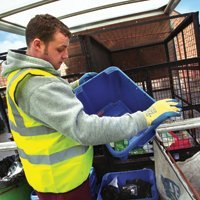
The challenges facing Corus include, among others, waste management, energy conservation, risk management and recycling. Corus tackles these through an integrated approach to environmental management. Corus invests heavily in research and development to create better products for its customers and for society as a whole.
Corus’ activities are focused on steel. Its products are durable, adaptable, reusable and recyclable. It is therefore possible to create ways of managing negative impacts on the environment. For example:
- Corus makes sure that all wastes are handled properly. It has created key targets for managing and reducing emissions.
- Corus continually seeks new ways of reducing the amount of energy used in its manufacturing and recycling operations.
- A high priority is given to risk management to reduce the number of accidents at work.
Corus’ products are essential to modern life. For example, Corus steel is used in affordable packaging and energy-efficient modular homes and buildings like the new Olympic stadium, as well as in lighter, stronger and safer transport systems, such as trams.
Why sustainability is important
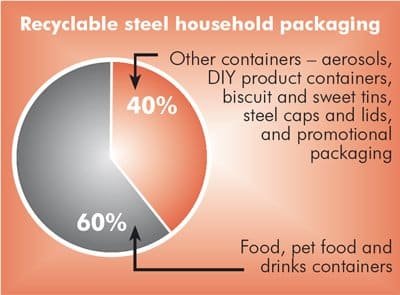
Corus is the largest steel recycler in the UK. Corus Steel Packaging Recycling promotes the recovery of used steel packaging to:
- consumers
- local authorities, waste management companies and collectors
- businesses and its customers.
Steel is unrivalled as a sustainable packaging material for a number of reasons:
- Steel is derived from two of the earth’s most plentiful natural resources iron ore and limestone.
- Steel can be recycled time and time again without any loss of quality.
- Steel is easy to extract from the waste stream using kerbside collections, can banks
- and magnetic extraction.
- Steel scrap will be recycled and reused to make new steel products.
Environmental benefits
Recycling steel has major environmental benefits. By recycling steel, Corus can:
- help preserve natural resources
- help protect the environment
- meet government targets for reducing waste the longer-term target for recycling steel packaging is 55% by 2010.
Steel is the most recycled packaging material in Europe. All steel packaging is 100% recyclable. European steel currently contains at least 54% recycled steel.
Levels of recycling
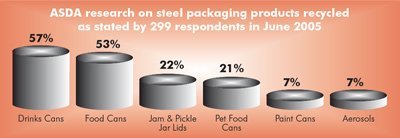
Corus is working hard to make the public aware that all steel packaging can and should be recycled. Research undertaken by Corus in partnership with ASDA in 2005 demonstrated this point. The people questioned showed a relatively high knowledge about what steel packaging products could be recycled.
However, when questioned about which of these products they actively recycled, the results were different. It is clear that there is still work to be done to increase consumer awareness of the wide range of steel packaging that can be recycled.
Corus wants to make the public aware how steel packaging can be re-used through a closed loop ‘steel to steel’ recycling process. Consumers play a key part in this continuous loop process.
If they recycle the steel products they buy in the first part of the loop, these enter the production chain in the second part. So the steel travels from the consumer, to the recycling box, then to the recycling facility. The steel is then transformed at the steel reprocessor and shipped back to manufacturers ready for re-use as new products. This creates a continual cycle of steel re-use which can happen many times.
Sustainability and stakeholders
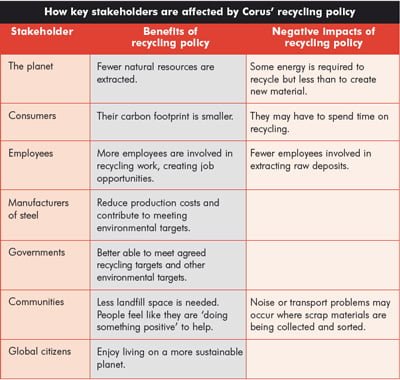
One of the most important choices a company makes is how to use its scarce resources. Corus seeks to balance the needs of its stakeholders by building sustainable development principles into all aspects of business activity.
The ‘steel cycle’
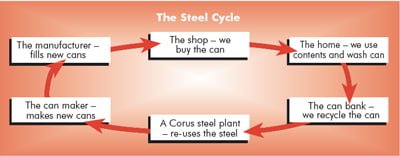
The ‘steel cycle’ shows how four main stakeholder groups are involved in steel recycling:
1. consumers
2. manufacturers of steel products (such as Corus)
3. supermarkets that sell steel packaging to us and provide recycling banks
4. local authorities that provide local recycling facilities.
Wider involvement
Corus is involved in wider industry and international steel groups such as the International Iron and Steel Institute (IISI). This group promotes sustainable steel manufacturing on a global scale and supports recycling initiatives.
On the IISI website an interesting film clip, ‘Steel and You’ demonstrates the various ways in which steel plays a part in our lives, as well as the importance of recycling and responsible steel manufacture.
In addition, Corus has its own education programme. This includes a new website called SCRIB where people can download educational and fun activities in English and Welsh to increase their recycling knowledge.
Benefits and costs of recycling
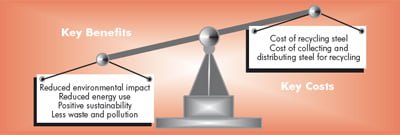
A benefit is anything that has a positive impact. It can be internal to the business or affect individuals and groups outside the business. A cost is anything that has a negative impact. It can be either internal or external.
When examining benefits and costs, it is standard practice to try to measure them. The usual way to do this is to attach a monetary value to the costs and benefits. Businesses carry out decisions when the benefits outweigh the costs. By continually monitoring its performance, Corus is increasingly able to reduce costs and deliver benefits to stakeholders.
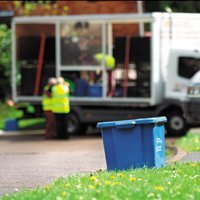
Corus enjoys both social and financial benefits from recycling. Everyone can see how the company is actively working to improve the environment. A cost-benefit analysis has also shown that the benefits of recycling are much greater than the costs.
Key Performance Indicators
The performance of a company can be measured by creating Key Performance Indicators (KPIs). These give the company targets to work towards and help to measure success.
Corus has created a number of KPIs that focus on becoming more sustainable including:
- by 2010, reducing total energy consumption in the UK by 11.5% compared to 1997
- by 2010, increasing the steel packaging recycling rate in the UK to 55%
- achieving compliance with required emission levels.
Conclusion
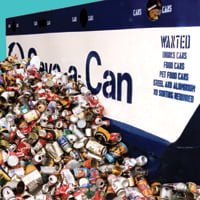
Corus creates policies and operates plans to use steel in a sustainable way. Government and supermarkets are working together to create the recycling facilities but we as consumers play a vital role in the steel cycle.
The steel packaging we put in can banks or kerbside recycling boxes are recycled over and over again without any loss of quality. If we behave in a responsible way with this, we can make an important contribution to sustainability.
